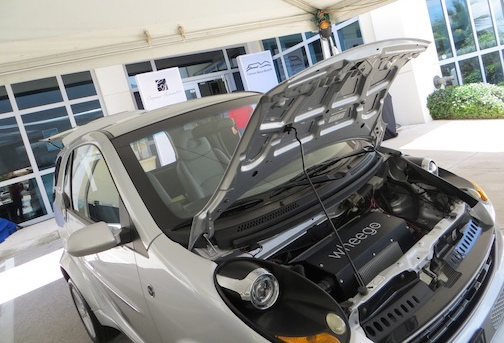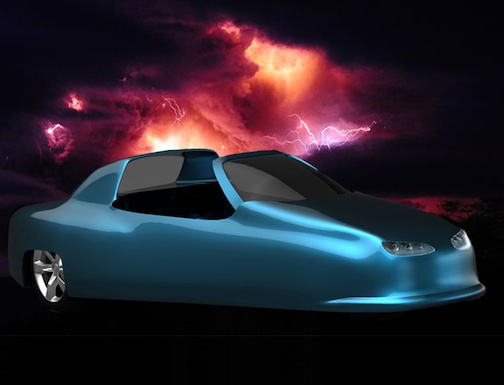Above: the Wheego LiFe (CJ Photo)
By Alexander Britell
GRAND CAYMAN — It began with a small group of cars under a white tent just across from Seven Mile Beach in Grand Cayman — but it could herald the start of a large movement in the Caribbean.
Last week, Cayman Automotive hosted the first-ever Caribbean International Electric Auto Show, an expo putting cutting-edge electric car designs on display.
The show was the effort of Cayman Automotive, which introduced the first electric car to the Caribbean in 2009 and is now the region’s exclusive electric dealer.
“Now that the [electric car] law has finally been passed, that the regulation is finally done, customers can now drive an electric vehicle in the Cayman Islands,” John Felder, president and CEO of Cayman Automotive, told Caribbean Journal. “So this is truly historic.”
The Caribbean International Electric Auto show featured six different vehicles, from the Wheego LiFe to an in-development electric roadster from Shockwave Motors.
“You’re going to see more and more of these on the road,” said Ken Wambold, regional sales manager for Atlanta, Ga.-based Wheego, a three-year-old company which is also developing a five-passenger electric crossover modeled on the Toyota Venza that he called a “soccer mom’s dream.”
Wheego is planning to increase its worldwide dealer network to about 100 by 2015, he said, along with further expansion in Caribbean islands like Puerto Rico and Jamaica and in the Dominican Republic.
The Wheego LiFe vehicle that was on display at Cayman Automotive has a range of about 100 miles, with a top speed of 65 miles per hour.
It takes seven or eight hours to charge the cars at home. Charging at a station, of which Grand Cayman already has two, involves about the time it takes for a run to the local market.
There are plans for 14 to 15 such stations, with the aim of making them solar-powered.
“These islands are absolutely perfect for electric vehicles,” Wambold said.
For the sporting-inclined, Shockwave is offering its Predator EV3 roadster.
The company, which is based in eastern Tennessee, is looking at the possibility of setting up local manufacturing in Cayman and other islands, according to Shockwave’s John McMillian.
“Our design plan is very simple and straightforward — we have a fiberglass body and a tubular steel chassis that we can fabricate anywhere,” McMillan said. “Our whole thing is to market in local markets so that we don’t have to worry about building cars and shipping them — plus, it brings jobs to a local community.”
The electric car movement could be particularly beneficial to a region whose fuel costs continue to rise.
For Cayman Automotive, the hope is to sell between 2,000 and 3,000 electric vehicles within the next five years, with a portion of that including fleet sales.
Felder, who is the exclusive dealer for eight other countries in the Caribbean, said an electric motorcycle is also on the way.
“I think that, in the next 10 years, electric cars and hybrids will be dominant, probably controlling 50 percent of the market share in the region,” he said. “It just makes sense.”

